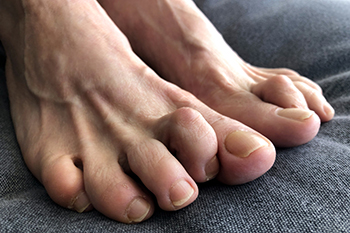6650 Frankford Ave
Philadelphia, PA 19135
 Hammertoe is a common foot deformity in which one or more of the smaller toes bend downward at the middle joint. Over time, the affected joints become stiff and difficult or even impossible to move. The tops of the affected toes can develop corns, blisters, and calluses from rubbing up against your shoes, causing pain and making it difficult to find proper footwear. Hammertoe is progressive, meaning it gets worse over time when it is left untreated. When caught in its earlier stages, hammertoe can be treated with conservative methods. These include wearing comfortable, properly fitted shoes, wearing orthotic inserts, and padding the affected toes to prevent skin irritation. For more information about hammertoe, please consult with a podiatrist.
Hammertoe is a common foot deformity in which one or more of the smaller toes bend downward at the middle joint. Over time, the affected joints become stiff and difficult or even impossible to move. The tops of the affected toes can develop corns, blisters, and calluses from rubbing up against your shoes, causing pain and making it difficult to find proper footwear. Hammertoe is progressive, meaning it gets worse over time when it is left untreated. When caught in its earlier stages, hammertoe can be treated with conservative methods. These include wearing comfortable, properly fitted shoes, wearing orthotic inserts, and padding the affected toes to prevent skin irritation. For more information about hammertoe, please consult with a podiatrist.
Hammertoe
Hammertoes can be a painful condition to live with. For more information, contact John M. Fanelly, DPM from Northeast Philadelphia. Our doctor will answer any of your foot- and ankle-related questions.
Hammertoe is a foot deformity that affects the joints of the second, third, fourth, or fifth toes of your feet. It is a painful foot condition in which these toes curl and arch up, which can often lead to pain when wearing footwear.
Symptoms
Causes
Genetics – People who are genetically predisposed to hammertoe are often more susceptible
Arthritis – Because arthritis affects the joints in your toes, further deformities stemming from arthritis can occur
Trauma – Direct trauma to the toes could potentially lead to hammertoe
Ill-fitting shoes – Undue pressure on the front of the toes from ill-fitting shoes can potentially lead to the development of hammertoe
Treatment
Orthotics – Custom made inserts can be used to help relieve pressure placed on the toes and therefore relieve some of the pain associated with it
Medications – Oral medications such as anti-inflammatories or NSAIDs could be used to treat the pain and inflammation hammertoes causes. Injections of corticosteroids are also sometimes used
Surgery – In more severe cases where the hammertoes have become more rigid, foot surgery is a potential option
If you have any questions please contact our office located in Philadelphia, PA . We offer the newest diagnostic and treatment technologies for all your foot and ankle needs.